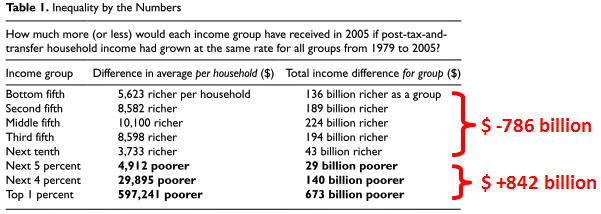Our complex modern economy increasingly rewards education and skills. Does this explain the huge rise in income inequality over the past few decades? Ezra Klein:
That explanation is intuitively appealing, but it doesn’t fit the facts. For one thing, Europe had the same technological revolution, but without the attendant increase in inequality. For another, the startling changes in inequality was between those at the 99th percentile and those in the 90th percentile. It was the tippy-top pulling away from the top, or what I like to call “the conehead economy.” If you imagine the economy as the person, it’s grown eight inches, and most of that growth has been in its forehead.
Matt and Alex both double back on this and note that technology does play a major role here, and they’re right: The Internet, television and other forms of mass media and communication make it much easier for one person or firm to serve a national or international audience. To use an easy example, Kobe Bryant can make more money because the Chinese watch his basketball games and pay him to endorse their products (that’s not a random example, incidentally).
Two points. First the minor one: the idea that sports stars and Hollywood celebrities and J.K. Rowling are driving the growth in inequality is just flat wrong. There simply aren’t enough of them. If you take a look at income statistics, the tippy top is occupied almost entirely by corporate executives, Wall Street financiers, and a motley collection of doctors, lawyers, and other high-paid professionals. Sports and entertainment personalities make up only a few percent of the total.
But there’s a bigger point to make here too. It’s true that one of the great mysteries of the modern American economy is that the biggest growth in income inequality hasn’t been between, say, the average worker and the well-off computer programmer. The biggest growth has been between the programmer and the white shoe lawyer. And an even bigger chasm has developed between the white shoe lawyer and the Fortune 500 CEO. In other words, the biggest change in inequality has mostly been within the top 10% or so. Any explanation has to grapple with that fact.
Still, all that extra money had to come from somewhere. And there’s not much question where that is: the middle classes. Basically, the overall economy has grown considerably over the past 30 years, generating lots of additional income. However, the vast middle of the wage-earning class has received only a small part of that income growth. The chart below shows how much less income the working and middle classes have gotten because their earnings didn’t increase at the same rate as overall economic growth:

So about $800 billion per year has been transferred from the bottom 90% to the top 10%. In addition, it turns out that within the top 10%, almost all of that $800 billion has gone to the top 1% and especially to the top 0.1%.
So there are, in fact, two mysteries here. First, what caused middle class incomes to stagnate, thus making a gigantic pool of additional money available to the better-off? Second, why did that giant pool go almost entirely to the rich and super rich? Any theory of rising income inequality needs to answer both those questions.














